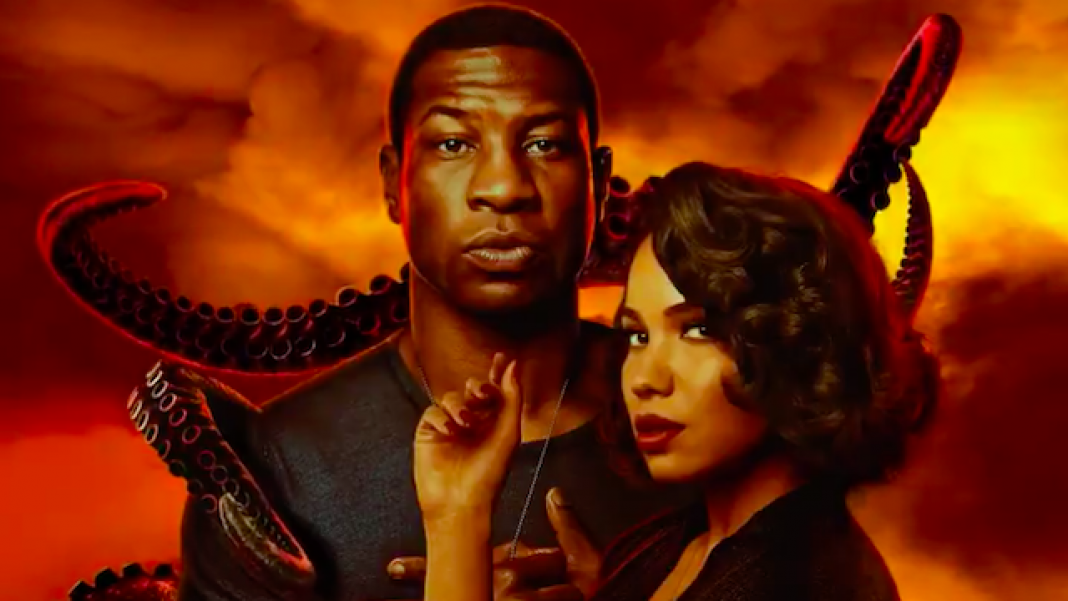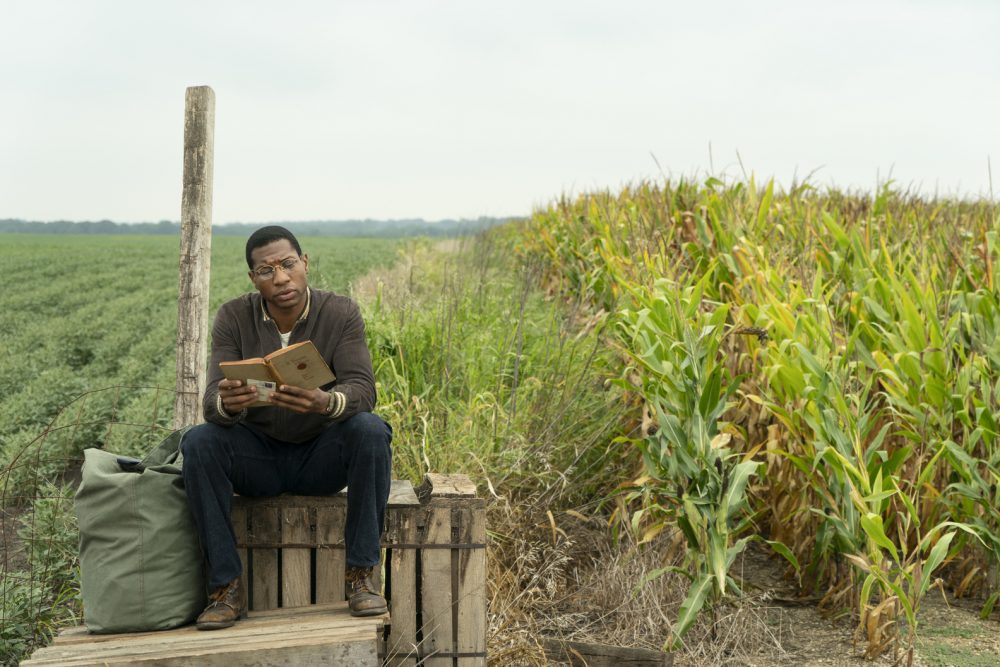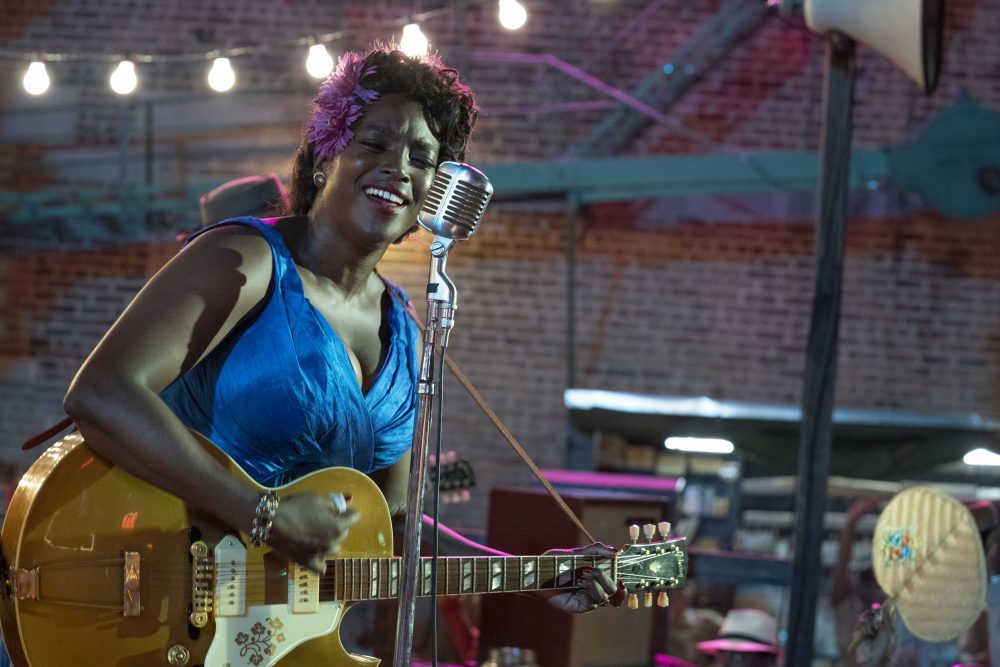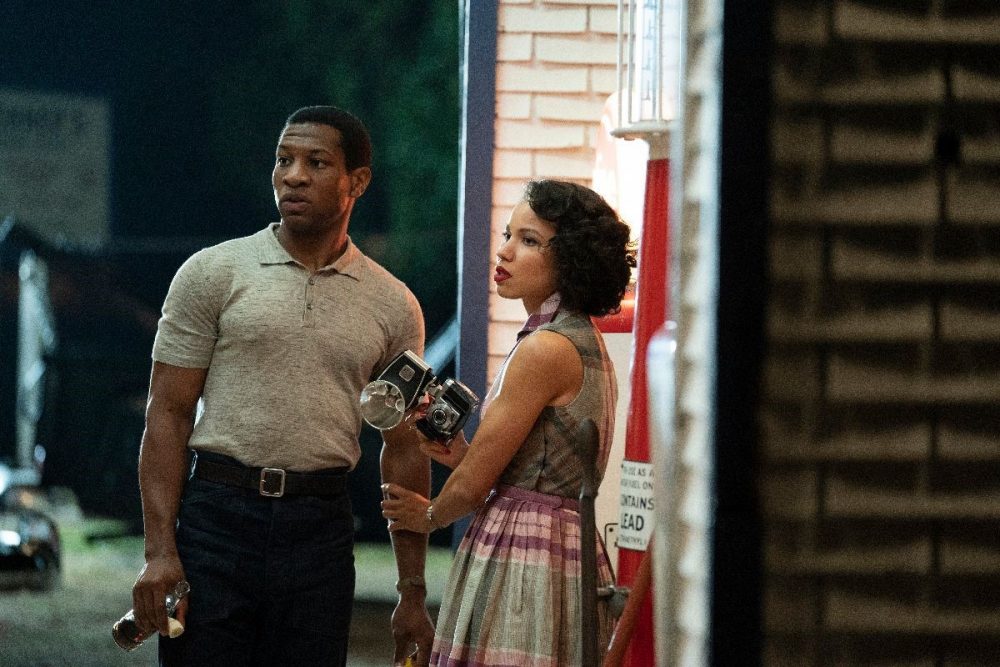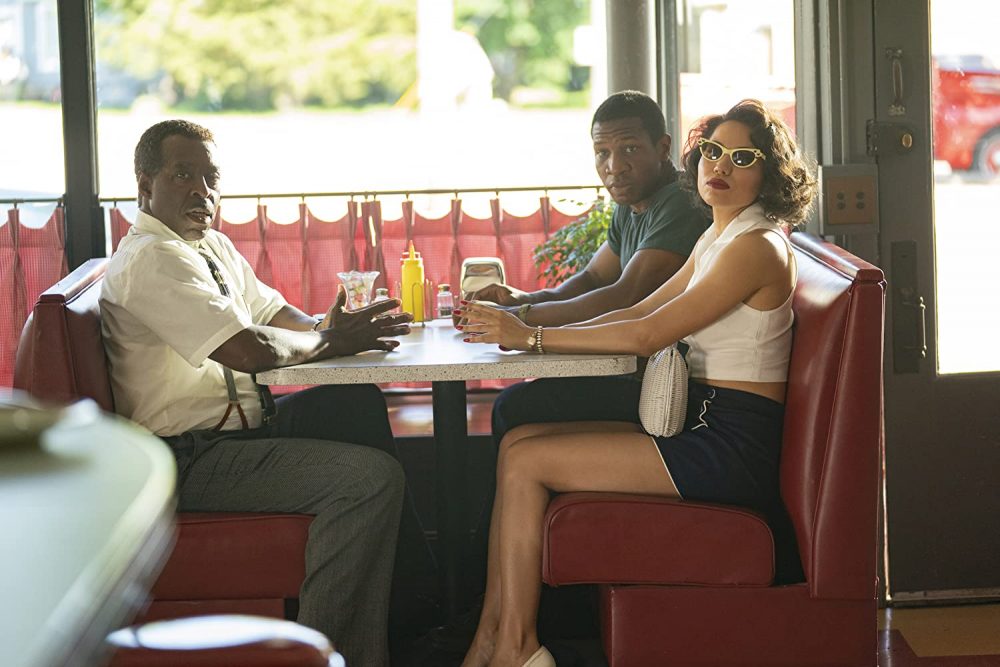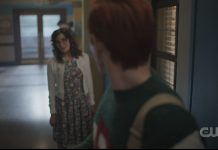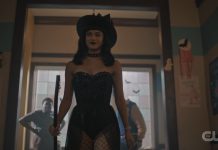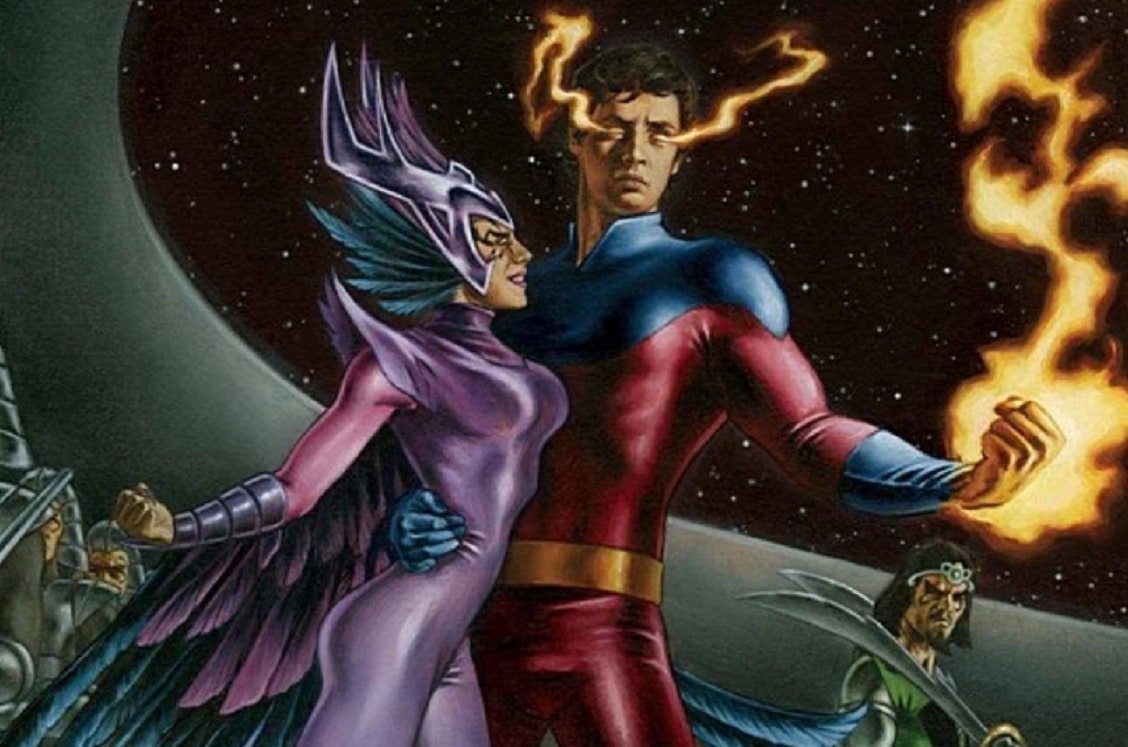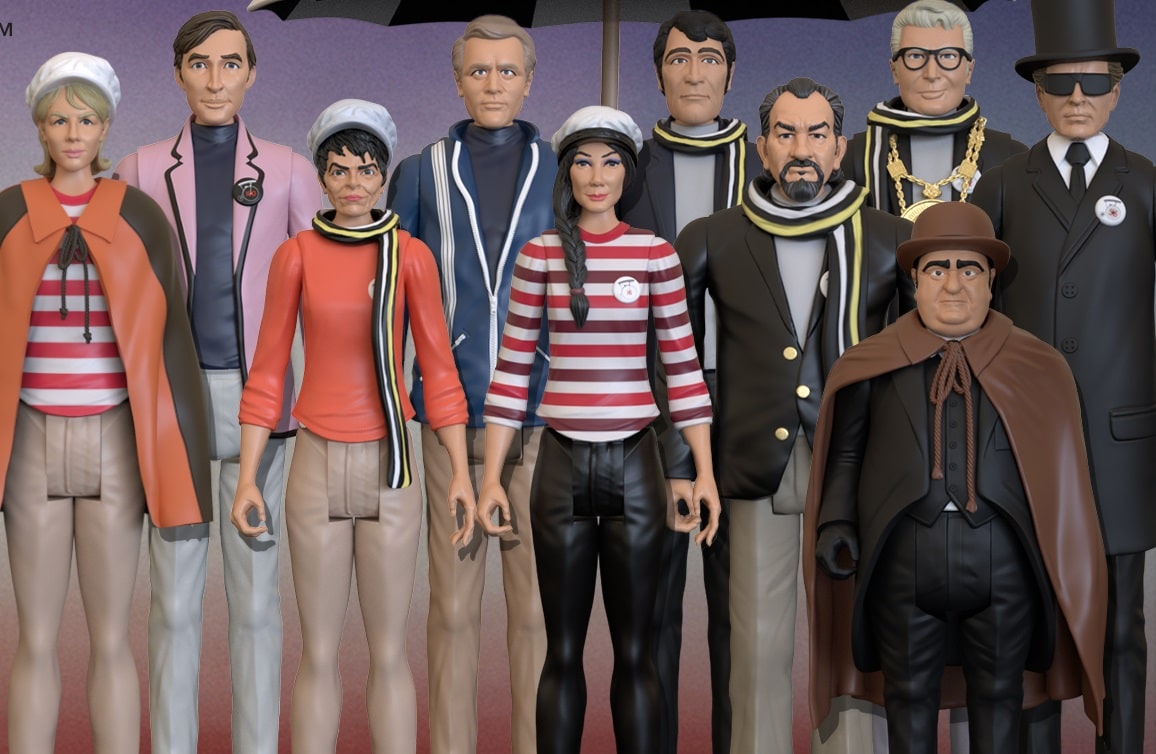War and strife are as American as apple pie, or maybe even more so, for America and her soldiers have always been embroiled in conflict – both domestic and abroad – from the moment the Pilgrims landed on Plymouth Rock. One of those wars was the Korean War, where American forces, as part of the United Nations, fought on the side of South Korea against the North and its allies. In this war was a young Black man, Atticus “Tic” Freeman (Jonathan Majors), our protagonist.
“Sundown” begins with Atticus making his way through a trench, fighter jets battling against each other in dog fights overhead, their gunfire illuminating the sky. As Tic stumbles his way over the rim, he sees his infantry mates battling giant tentacled monsters, and spaceships drawing closer to the ground. Out of the lead ship, a woman with red skin descends in a beam of light. She grips him, whispers something intelligible in his ear, and turns his body in time to see Jackie Robinson cleave one of the aliens in two with his baseball bat. As the monster begins to come back together, Tic jerks awake. He’s in a bus, leaving Kentucky and it’s Jim Crow laws behind, unfortunately, he hasn’t left racism and segregation behind, for he and a Black female passenger are relegated to the back of the bus, as that’s where a dingy sign reminds them the “colored race” belongs.
After the bus breaks down, Tic and his co-passenger walk along the highway, as there was no place for them in the truck that collected the white passengers. Out of curiosity, and a way to break the silence, she asks about the book he was reading before the truck arrived, “A Princess of Mars” by Edgar Rice Burroughs. When he tells her it’s about John Carter, a former Captain in the confederate army who is transported to Mars, she scoffs at the notion of the hero being someone who fought for slavery, and remarks that “you don’t get to put an ex in front of that.” Tic tells her that stories, like people, aren’t perfect and should be cherished, their flaws overlooked. This scene, like many others in the episode, gave me much food for thought.
There are countless instances as a viewer, and reader I’ve either consciously or unconsciously overlooked the flaws of the heroes and heroines because the story was interesting, including John Carter, the 2012 film based on the same book being discussed. But in this context, there is a difference between character flaws such as rudeness for example, that can be overlooked, and the flaws of a character that stem from their personal belief system, like racism and the belief that slavery was necessary and good. As a Black man who served in the military, experienced racism within and without, it’s quite interesting how Tic is able to compartmentalize what John Carter is, from the story.
I guess for him, it was almost a necessity and even type of survival technique, because even in fiction he couldn’t escape symbols of oppression. And if he wanted to be able to enjoy the fantasy, he has to overlook it’s “flaws”, so that for just a short while, as long as he’s reading those pages, he can escape the horror of his reality. While reading those books he can place himself in the role of the hero who gets to defeat the monster and save the day.
In the South Side of Chicago, Black children are laughing and playing in water cascading from a fire hydrant, as soul music can be heard while a couple, Hippolyta (Aunjanue Ellis), and her husband George (Courtney B. Vance) in a moment of intimacy, discuss the wife’s intention to travel cross country to research and review establishments for “The Negro Motorist’s Green Book”, the guidebook for Black people that detailed safe travel routes and lodging, and locations to avoid such as Sundown towns. Hippolyta believes her reviews would be better as first-person accounts, rather than second-hand information George gives her from his trips.
When Tic arrives he shows a letter he received in South Korea, to his Uncle George. In it, Tic’s father Montrose (Michael Kenneth Williams) asks Tic to travel with him to Ardham, Massachusetts. In a fun nod to the show’s name and foreshadowing of the dangers to come, Tic at first misreads Ardham, as Arkham, the fictional home of Herbert West, the murderous scientist who experiments led to reanimated corpses…or zombies as they’re known as today.
After sunset, the streets have been turned into an outdoor concert hall for a block party. On the stage singing with all the soul Black women are known for, is Ruby Baptiste (Wunmi Mosaku). Out of a cab steps her sister Letitia ‘Leti’ Lewis (Jurnee Smollett-Bell), who upon being noticed is encouraged to get up on stage and sing with her sister. At the end, it’s immediately noticeable the sisters don’t exactly get along. After a brief argument about Leti easily finding work at the department story Ruby has been repeatedly denied a position at, she agrees to let Leti stay with her for two days and no more.
I can’t wait to see how their story develops. There’s a lot of not so subtle subtext about the differences in Ruby and Leti’s appearance having to do with who could and couldn’t get the job. Ruby being taller, darker, and plus size, play a part in how she’s perceived, received, and treated by society. Leti, being light skin and petite gives her an advantage because colorism has always been a part of racism that affects Black women differently to men.
I think Leti’s inability to see how her casual certainty of getting the job despite not being as qualified as Ruby, and not questioning that, is one of the reasons there’s animosity between them. She doesn’t see the privilege she has due to her looks. Oh, there’s so much more I can say about this, but I have the rest of the episode to get through.
With her two days up, Leti decides to travel with Tic and George, while Hippolyta will go with their daughter Diana (Jada Harris) (The nerd in me geeked at these names). As our intrepid trio travels further from the familiarity of the city, towards Ardham, they pass through small-town America. Along the way we see two Americas being exposed. The one where billboards of smiling white families promote the illusion of the “American Dream”, and the one with signs warning Black travelers that they’re entering Sundown Towns.
There’s the America where white teenagers and cops stand happily eating their ice cream cones, while a Black father and daughter stand at the “colored” window, being ignored by the staff. The two faces of America are the taunting, jeering, aping mockery of Tic and Leti, by white teenagers, while across the road is a giant sign with the smiling face of Aunt Jemima promoting her “delicious” pancake mix to those same racists. These scenes play silently, as a voice-over of James Baldwin is heard questioning who the “American dream” is for. Looking at that so-called American dream, and how Black people are treated, I have to ask is the “American dream” even something worth striving for? Isn’t it better for Black people to realize their own dreams?
Daylight comes and Tic, Leti, and George make a detour to Simmons Ville, a place marked on their atlas with trolls drawn by Diana. Before they set off, George not for the first time refers to Leti as “girl” and reminds her that she won’t be driving, and I was irked. For all the ways he’s progressive George is still conservative and set in his with old ideas of what women can and can’t do.
The scene serves as a reminder that with everything else Black women also have to deal with patriarchal beliefs from the men in their lives. Well, he learns just how silly those ideas are when Leti, runs – in heels mind you – through the restaurant they’ve stopped at, and books it for the driver’s seat. In an instant, the tone of the show changes. Tension immediately sets in as Leti speeds her way through the small streets, swerving to avoid the gunshots sent their way from the gunmen chasing them in a truck.
The chase mysteriously comes to a sudden halt as the truck crashes into an invisible wall, apparently created by a mysterious blonde woman. Eventually, they make it to safety at Leti’s brother’s house, who shares information about Ardham House, Devon County, a town founded by witch hunters, and its murderous sheriff. After some very tense scenes involving Tic and Uncle George, they finally make get back on the road, and with a chilling sense of foreboding, a car drives up as they’re pulled over to the side of the road to get their bearings. He tells them they have less than 9 minutes before the sun sets because Devon is a sundown county. Racing against the clock, Tic drives as fast and non-threateningly as he can. But the sun sets and they’re met by a blockade of police cars. The sheriff never intended for them to make it.
As Leti, George and Tic are lead into the forest, the reality that their lives are truly in danger is at the forefront of my mind. The monsters have finally come out in more ways than one. With inhuman sounds, strange multi-eyed beasts attack the officers, and our favorite trio runs as fast as they can to shelter, but not safety because in the abandoned shack with them is the sheriff, now bleeding profusely from his mangled shoulder.
But rather than fight with George and the others against the monsters, the sheriff and his deputy keep their guns trained on them, because even with their own lives in peril racists, are still racists. Sounds a lot like what’s going on with the pandemic, but I digress. Having been chosen as the sacrificial lamb to get the car, Leti is terrified to outside on her own, Tic tries to get her to calm down and shows his trust and confidence in her by telling her that she’s the one who’s going to save them, and she does.
For the first episode Lovecraft Country, showrunner and head writer Misha Green has done a stellar job of introducing viewers to the characters and this world of monsters and men. There are many elements that are familiar to us, but the way they’re shown is new. When have we ever seen a story where the alien monsters fill us with less dread than humans?
Lovecraft Country is about revealing how insidious racism is. How pervasive it is in America. How interwoven it is in the very fabric of the country, after all, it’s a country founded through genocide and made on the broken and bloodied backs of Black people. For Black people, the real monsters don’t only come out at night. They walk the streets under the bright rays of the sun. Their hatred and badges just as threatening sharp teeth of some fantastical beast hiding in the shadows.
But like Tic says, with the flaws are the things we can love and cherish, and I love and cherish seeing this family of Black nerds discussing things classic literature The Count of Monte Cristo. Diana creating a comic Orinthia Bue, whose space-traveling heroine is inspired by her own mother. Leti taking control of the situation when she has to and showing the men that she’s a woman who capable of doing more than they give her credit for. There are those who will say we’ve seen enough shows about racism, but I can guarantee, there’s never been a show that’s looked at racism this way, with characters like these. Trust and believe, you ain’t seen nothing yet.
Lovecraft Country airs Sundays at 9 on HBO.


